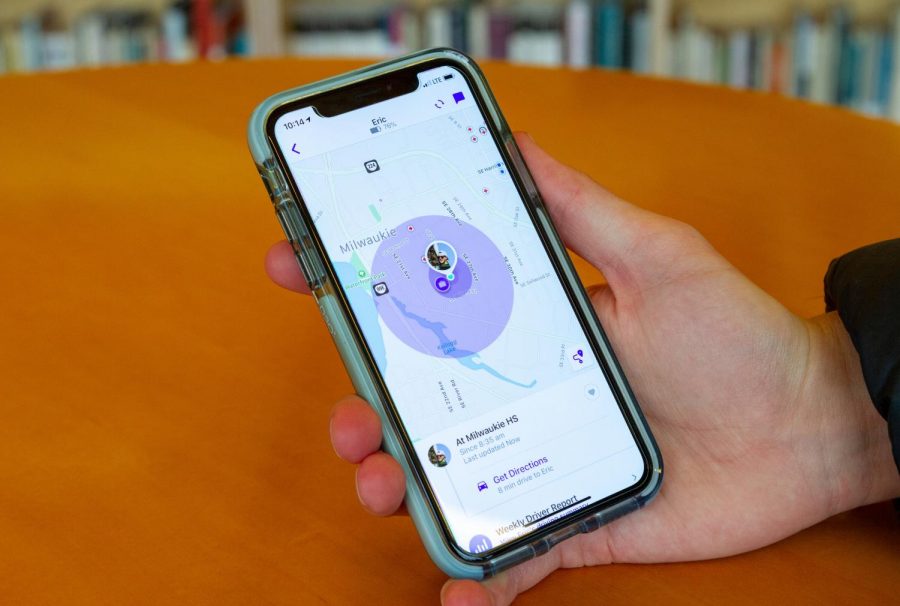Helicopter Parenting Needs to Stop: Parents Are Being Too Overprotective by Tracking Their Teenager’s Phones
Parents are losing more trust in their teenagers, leading them to want to track their teen’s location as well as their website history.
In a survey of 53 La Salle students, 56.6 percent of them reported that they are tracked in some way by their parents, whether it be their location or their website history.
January 16, 2019
Many parents today are tempted to track their teenagers’ phones. Students, especially those who are in high school, are driving, hanging out with friends, and going to parties. These are things that many normal teens do, yet these things can be extremely concerning for parents.
I can understand why parents worry about what their teenagers are doing and whether or not they can really trust them. But is it truly necessary for parents to monitor the internet usage and the location of their teens?
Most of these parents did not have their own parents tracking their location when they were teenagers because the technology to do so did not exist at the time. Why don’t teenagers today get the same amount of freedom that our parents got when they were our age?
Sure, the internet is more advanced today, and teens know far more about how to use it. However, even though the internet is more advanced and there are dangerous things that could be found on there, these possible dangers do not give parents an excuse to track their teenagers’ internet usage.
According to the Pew Research Center, 61 percent of parents with a teenager between the age of 13 years old and 17 years old track the websites that their teenagers visit on a regular basis.
Along with parents looking into their teenagers website history, 16 percent of those same parents use monitoring tools to track their teenager’s location, making sure that they can see where their teen is going any time of the day.
Personally, my parents track my cell phone location so that they can see where I am going when I am on the road driving. They began tracking my phone when I got a car just over a year ago. My parents track my phone because they want to make sure that I get to my location timely and safely.
At the same time, I am 17 years old, and even though I have been driving for a little over a year, my parents still do not trust that I will be going to the place that I say I will be going to.
In an anonymous poll of La Salle students, when asked if they believe that parents are being too overprotective by tracking their teenagers’ phones, a senior girl stated, “My parents feel as though I’m going to make bad decisions if they don’t [track my phone], when in reality I’d be more careful if they didn’t [track me].”
When my parents track my location, I feel as though they are suspicious of me. It makes me feel as though they don’t trust the decisions I am making, even though I am a responsible driver and I always communicate with my parents.
The ability that parents have to track teenagers’ phones makes young adults question whether or not their parents trust them, the amount of privacy that they really have, and whether or not their parents are actually going to let them grow up and let them be responsible.
Parents that refuse to let go of their children are sometimes called helicopter parents. Children who have helicopter parents can have major behavior problems such as being “burned out by the time they start college or [being] so fragile, the smallest amount of stress makes them break,” said Dr. Kathleen Elliot Vinson of Suffolk Law School in USA Today.
On a local level, fifty-three random La Salle students were polled and asked if their parents track them on a daily basis. Of these 53 students, 56.6 percent of them reported that they are tracked in some way by their parents, whether it be their location or their website history.
I believe that parents are being overprotective when they track their teenagers because it makes teenagers feel that they do not have enough privacy. For me, it makes me feel as though I am not responsible enough to communicate with my parents.
A well known telecommunication company, T-Mobile, has approximately 100,000 subscribers paying $9.99 per month to use a location tracking service called FamilyWhere. Unlike common apps such as Find My Friends, FamilyWhere tracks all phones that are on the phone plan.
With the app FamilyWhere, you can check location history for up to seven days. FamilyWhere also tracks the amount of cell phone usage that each member of the plan has.
In a New York Times article about parents tracking their teenagers Lisa Damour writes, “Plenty of adults balk at the idea of remotely following an adolescent’s movements, while others question why any loving parent wouldn’t.”
Communication between parents and teens is one of the most difficult things to do, especially when it comes to setting boundaries. Sometimes parents do not understand how to communicate with kids that just want to do their own thing, without their parents’ input, resulting in angry teens and frustrated parents.
Parents do not need to completely stop tracking their teenagers, but there needs to be a balance between the two. I believe that tracking teenagers’ locations constantly is unnecessary, but also that both sides need to speak up more; communication goes a long way. I think the real issue is that most teenagers, including myself, do not tell their parents enough.
By improving the communication between parents and teenagers, parents would trust their teenagers more with the things that they want to do, and teens would feel as though they have regained a sense of privacy since their parents would not be tracking them anymore.






Lukas Werner • Mar 6, 2019 at 7:30 pm
I agree very much, but when you dive into the things that google and such know about a person, they know more than what your parents know about you. And google and such have the problem that they sell that data to advertisers which is like helicopters parents on a whole new level. Now if anyone reading this wants to get away from google there are many alternatives that won’t sell your information.
Nicole Khoury • Jan 16, 2019 at 7:43 pm
I totally agree with what you said, especially the last two paragraphs and how parents tracking their children’s phone yet also communicating with them should be a balanced situation. I know how hard it is because I myself have been/am in that situation with my parents tracking where I drive. And sometimes kids feel like their parents don’t trust them (exactly like what you said). But I also understand where some parents are coming from, and most definitely where my parents are coming from. Our generation, our society, and our world today is sooooo much more different than what our parents grew up in. We are open, especially at a young age, to really bad, difficult, and dangerous situations nowadays. From my understanding, parents just want their kids to feel safe no matter what. We are their world and if anything happened to us…I don’t know how any parent could deal with it. Yes, there are some VERY overprotective parents out there and they should definitely read this article and see that they should put some trust in their kids. Like you said, communication is KEY and we, as a society, truly we lost the way how we should communicate with one another. Technology has taken over our minds and our world and it’s really sad that it has. I think putting away the phone and the internet and truly spend a day with your family because that’s how trust is earned: when you talk about one another and share your opinions about any type of topic. Parents these days don’t even know their kids because, as stressed out and very hormonal teens, we shut them out. I guess we won’t really understand the real reason behind WHY parents can be so overprotective until we have kids ourselves!
Anyways, great article anna! I really enjoyed reading it and I can’t wait for more articles by you to come. Keep it up:)